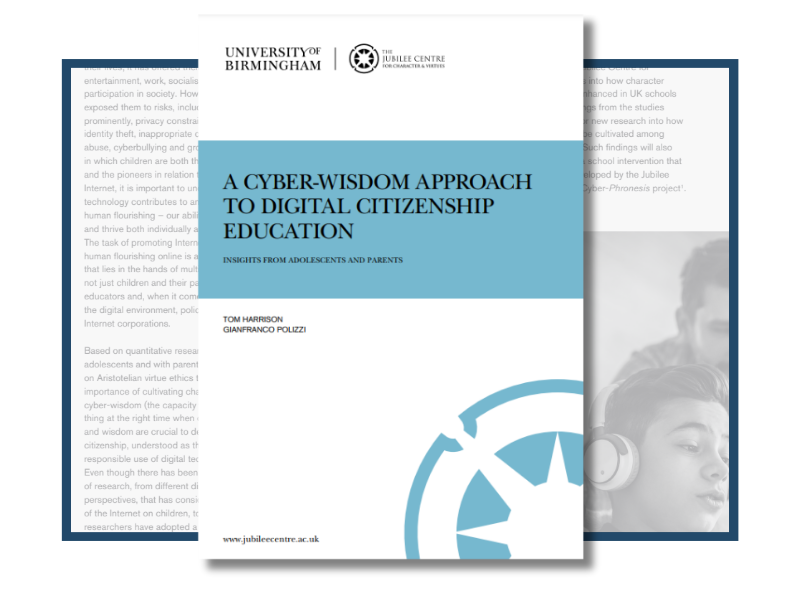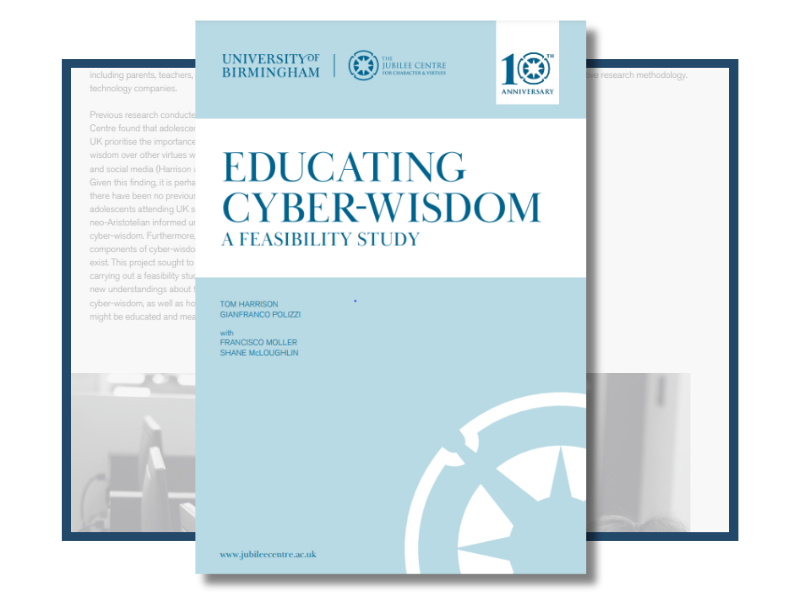Project Overview
Cultivating Cyber-Phronesis research project builds on the Jubilee Centre’s work on phronesis in ways that apply specifically to the online world. We live in an age in which the Internet, which has become so ubiquitous, presents not only a range of opportunities but also a number of risks, from issues of privacy to cyberbullying and online abuse.
This project employed a mixed methods approach to explore whether, how and to what extent a targeted approach to character education can help adolescents aged 13-16 make better ethical decisions online. Grounded primarily in Aristotelian virtue ethics, the concept of cyber-phronesis, or cyber-wisdom, is understood here as a meta-virtue that can enable Internet users to make moral and wise decisions online that are informed by different virtues, including, for instance, honesty and compassion.
The Cultivating Cyber-Phronesis school resources for pupils aged 13-16 are freely available to use here.

A Cyber-Wisdom Approach to Digital Citizenship Education: Insights from Adolescents and Parents
This report presents and compares key findings from two surveys which explored the extent to which both adolescents and parents understand the importance of, and act on, wisdom and character virtues in the digital age. Key findings from the surveys suggest that the virtue that most adolescents want their friends to show on social media is wisdom, with 38% choosing this as one of their top two desired qualities. Similarly, asked to select two qualities, most parents (56%) want their children to show wisdom when using the internet. Further findings are discussed in greater depth throughout the report.
Educating Cyber-Wisdom: A Feasibility Study

Educating Cyber-Wisdom, presents theoretical, empirical, and practical findings about how the virtue of cyber-wisdom might be cultivated. The report brings new understandings about how cyber-wisdom might be conceptualised, educated and measured.
Key findings of the report include the development of the world’s first four component model of cyber wisdom education and the preliminary validation of new measures for all four of the components that can potentially be used in the future, as well as providing insights into the positive impact of a new targeted course developed by the team aimed at 13 to 16-year olds.

Publications
Integrating Cyber-Wisdom Education into the School Curriculum, Insights Series, published by Dr. Gianfranco Polizzi and Dr. Tom Harrison, offers an overview of the foundations and purpose of the project.
A Cyber-Wisdom Approach to Digital Citizenship Education, published on 13th April 2021, this report presents and compares key findings from two surveys which explored the extent to which both adolescents and parents understand the importance of, and act on, wisdom and character virtues in the digital age.
Promoting Character and Wisdom Through Digital Citizenship Education Consultation, On 12th July 2021, on behalf of the Jubilee Centre, the Cultivating Cyber-Phronesis project team invited three digital citizenship experts from a diverse range of fields to write and present short position papers exploring how character and cyber-wisdom might be cultivated more and most effectively through digital citizenship education.
Educating Cyber-Wisdom: A Feasibility Study, published 13th October 2022, this report presents theoretical, empirical, and practical findings about how the virtue of cyber-wisdom might be cultivated. The report brings new understandings about how cyber-wisdom might be conceptualised, educated and measured.
Futureproof: A Comprehensive Framework for Teaching Digital Citizenship in Schools. Published 2nd May 2022, this book shows leaders how they can educate for digital citizenship through the adoption of a new, comprehensive and coherent framework.
Virtual Reality and Character Education: Learning Opportunities and Risks, Journal of Moral Education, published by Dr. Tom Harrison on 9th April 2023. The aim of the article is to get ahead of the EdTech developers and provide theoretical, conceptual and practical insights that will help ensure that the promise of VR to enhance character education can be realised.
Wisdom in the Digital Age: a Conceptual and Practical Framework for Understanding and Cultivating Cyber-Wisdom, Ethics and Information Technology, published on 4th March 2022. This article proposes a framework for conceptualising what we call cyber-wisdom, and how this can be cultivated via formal education, in ways that are grounded in neo-Aristotelian virtue ethics and that build on three prominent existing models of wisdom
(In)civility and Adolescents’ Moral Decision Making Online: Drawing on Moral Theory to Advance Digital Citizenship Education, Education and Information Technologies, published 17th September 2021. This article draws on moral theory to advance digital citizenship education and explore how adolescents aged 13–16 make decisions when confronted with incivility, such as cyberbullying, on social media.
